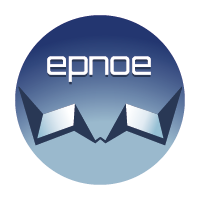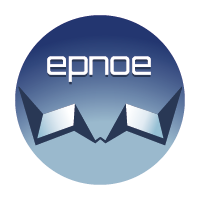EPNOE – Workshop
“Modern analytical approaches in biopolymer characterization”
When:
February 26th 2020: 9 am – 5 pm; February 27th 2020: 9 – 12 am
Where:
BOKU Vienna, UFT Tulln, Konrad-Lorenz-Str. 24; A-3430 Tulln
The University of Natural Resources and Life Sciences, Vienna and EPNOE would like to announce the
workshop “Modern analytical approaches in biopolymer characterization”. The course focuses on state-
of-the-art analytical tools for the characterization of natural polymers, in particular polysaccharides and
lignin.
A modern view on biorefineries implies the smart use of biopolymers, with industrial applications going
beyond the simple use as a food and/or energy feedstock. For this scenario to be realized, analytical
approaches revealing the structural peculiarities of these biopolymers in a rapid and reliable way are an
absolute prerequisite. An efficient chemical and physical analysis is challenging for most biopolymers
due to their complex composition and structural organization. A comprehensive characterization of such
a sample requires a combination of different analytical methods. These analytical challenges will be
addressed within the two days of the workshop.
The lectures will provide an overview of different biorefinery process streams and discuss the current
challenges hindering the direct analysis of the contained biopolymers. The principles, conventional and
advanced applications of different analytical methods will be explained, supported by examples of their
use in cellulose, hemicelluloses and lignin characterization. The course will cover a wide range of
techniques, from NMR in liquid and solid states, over chromatography with different hyphenation
methods, to microscopy and infrared / Raman spectroscopy. High performance thin layer
chromatography (HPTLC) and field flow fractionation methods for monitoring process flows and
biorefinery streams are presented, as well as rapid methods for the characterization of technical lignin
samples.
Lecturers and topics (selection):
Prof. Dr. Paul Kosma: Applications of NMR
- Principles of NMR spectroscopy (magnetic moment, chemical shift, spin-spin coupling, coupling constant)
- Example: Structure elucidation of a bacterial polysaccharide by NMR
- Protein NMR and applications in biomolecular NMR (protein structures and dynamics, ligand interactions)
- Principles of solid state NMR and HR-MAS with applications in food sciences
Dr. Irina Sulaeva: SEC and FFF-MALLS Assoc.
- Overview on the basic separation approaches – GPC and FFF – their advantages and drawbacks
- Sample detection possibilities during online molar mass measurements
- Calibration vs. MALLS: the best approach to get the molar mass values
- Some solutions for troublesome samples, e.g. lignin, hemicellulose nanoparticles, etc.
Prof. Dr. Notburga Gierlinger: FTIR and RAMAN Ass.
- Principles of Raman & FT-IR spectroscopy
- Advantages and drawbacks of the methods when applied to lignocellulose
- In depth analysis: coupling with microscopes for chemical imaging
- Fast prediction of parameters based on vibrational spectra and multivariate calibration models
Prof. Dr. Stefan Böhmdorfer: HPTLC
- Benefits of Thin Layer Chromatography for challenging Samples
- Parameters that improve separation quality
- Hyphenation and unusual detection methodologies
- Quantification
Prof. Dr. Thomas Rosenau: Chromophores in cellulosics
- Fundamentals of bleaching chemistry
- Chromophore sources in cellulosics
- Chromophore formation, yellowing and aging – mechanisms, structures, analytical approaches
- Example: Isotopic labeling as a means to clarify the structure of chromophores from hexeneuronic acids (HexA)
Prof. Dr. Antje Potthast: Speed analysis of lignins
- Bottleneck for fast approaches – Sample preparation
- Oligomers of polysaccharides
- Lignin functional groups – general approaches
- Advanced Polymer Chromatography for lignocellulose – advantages and limitations
Venue:
The workshop is held at the University and Research Center Tulln (UFT).
There is a frequent train connection from Vienna to Tulln (20 min.)
https://fahrplan.oebb.at/bin/query.exe/en
A wide choice of Hotels is available both in Vienna and Tulln.
Nearby Vienna International Airport is a major hub that can
be easily reached from all European countries and major cities.
In Tulln:
Hotel Roemerhof: https://www.hotel-roemerhof.at/englisch/e_hotel_ausstattung.html
20 min walk to the Campus
when mentioning: ‘BOKU EPNOE’ rate: EUR 74 (plus EUR 10,00 breakfast)
In Vienna:
Hotel Bellevue (next to the train station Franz-Josefs-Bahnhof): https://bellevue-hotel-vienna.hotel-ds.com/en/
when mentioning: ‘BOKU EPNOE’ rate: EUR 84,00 for a single including breakfast
Derag Hotel Kaiser Franz Joseph (short bus drive from Hotel to train station Heiligenstadt): https://www.living-hotels.com/hotel-kaiser-franz-joseph-wien/en/zimmer/
when mentioning: ‘BOKU EPNOE’ rate: EUR 77,00 for a single Economy and EUR 81,00 for single Economy plus (including breakfast)
Price for this workshop: € 200,00 (+VAT) coffee breaks and lunches included
Deadline for registration is February 21st.

